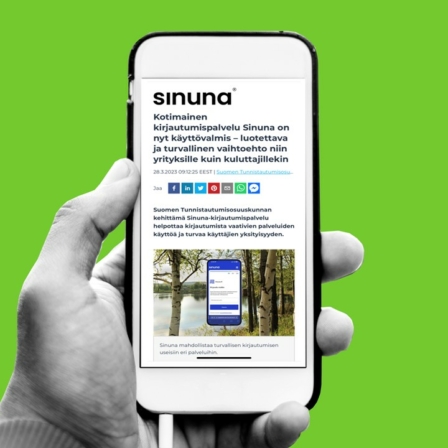Digipower investigation
How are decision-makers influenced? The purpose of this unique project is to identify new ways of exercising influence and to improve the transparency of the use of data.
What is it about?
The volume of data and value of data-based business are increasing at a rapid rate. Nevertheless, we have little knowledge of how data about us is collected and used. An understanding of the significance for society of data-based online monitoring and profiling is still lacking.
The Digipower investigation looks at power in many ways: the aim is to find out how the decision-maker participants can be influenced by the data collected about them. At the same time, the investigation will reveal the parties that collect data about us when we use a variety of online services.
The report aims to identify new mechanisms of influence and develop solutions to make the data economy fairer and more sustainable, as well as to examine this knowledge from the perspective of democracy. For individuals, this can mean increased opportunities to benefit from data collected about them in the form of better services.
Background: Currently, the structures, operating methods and incentives of the data economy are not fair from the point of view of either individuals or most businesses. Data about individuals, its use and the economic benefit from it are currently centralised in the hands of a few global giants. The lack of transparency surrounding data use and algorithms undermines the foundation of trust between people and towards social institutions. This also poses a threat to the sustainability of democracy.
What are we doing?
The Digipower investigation involves 15 socially active and well-known participants, such as political decision-makers, whose identities will be revealed during November 2021. They will be using test phones customised for the project, with an app monitoring where target companies are sending data to. A secure “bubble” has been built for collecting and analysing data, making it possible to carry out the investigation while respecting the participants’ data security and privacy.
The test subjects will also submit subject access requests (SAR) to businesses and organisations, use services and complete tasks on their test phones and use the download dashboards of apps and services.
Data collected by the app and its analysis will look for answers to the following questions:
- With whom do Finnish and European decision-makers share their data?
- What kind of an overview can be built with the collected data?
- What kinds of parties hold data and how is it used to profile service users and target content?
- Can the collected data be used to influence the person connected to the data?
Who is involved?
Sitra is the initiator, sponsor and co-ordinator of the investigation. In addition to the participants, Hestia.ai is a key partner. Through Hestia.ai, the investigation involves Paul-Olivier Dehaye, a Belgian mathematician, data specialist and internationally renowned data activist. Check out Paul-Olivier’s thoughts on trust (video).
The participants are:
- Anders Adlercreutz, Member of the Finnish Parliament – @adleande
- Leïla Chaibi, Member of the European Parliament – @leilachaibi
- Filomena Chirico, European commission official, member of the cabinet of Commissioner Thierry Breton – @FiloBXL
- Christian D’Cunha, European Commission/Directorate-General for Communications Networks, Content and Technology
- Stéphane Duguin, CEO of the CyberPeace Institute – @DuguinStephane
- Atte Harjanne, Member of the Finnish Parliament, Chairperson of the Green Parliamentary Group – @AtteHarjanne
- Jyrki Katainen, President of Sitra – @jyrkikatainen
- Dan Koivulaakso, State Secretary, Left Alliance – @koivulaakso
- Miapetra Kumpula-Natri, Member of the European Parliament – @miapetrakumpula
- Markus Lohi, Member of the Finnish Parliament – @markuslohi
- Tom Packalén, Member of the Finnish Parliament – @TomPackalen
- Sirpa Pietikäinen, Member of the European Parliament – @spietikainen
- Mark Scott, Chief Technology Correspondent, Politico – @markscott82
- Niclas Storås, journalist, HS Visio – @niclasstoras
- Sari Tanus, Member of Parliament, Christian Democrats – @saritanus
Where are we now?
The data collection and analysis phases of the digital trails investigation will take place in November and December 2021. The first results will be published on 1 April and the final results in May 2022.
You can monitor the progress of the investigation on this project page; we will update the news on a weekly basis.
The report builds on Sitra’s 2019 Digitrail study that monitored how much data is collected about the users of digital services and to how many third parties the data is relayed.















Latest